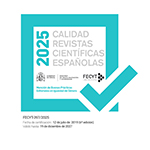Mejora de la precisión lectora en alumnado hispanohablante de Educación Infantil y Primaria: un meta-análisis
Resumen
La precisión lectora es una condición para la adecuada comprensión de los textos. Para su mejora se han empleado intervenciones como el entrenamiento de la conciencia fonológica, enseñanza de las relaciones entre letras y sonidos, trabajo de la morfología, la escritura y mejora de la motivación. No se han realizado estudios de síntesis sobre la mejora de la precisión lectora en hispanohablantes, algo que trata de solventar este trabajo.
El proceso de búsqueda permitió localizar 28 efectos independientes de distintas intervenciones sobre la precisión lectora de alumnado desde 1º de Educación Infantil hasta 5º de Educación Primaria. Las intervenciones realizadas tuvieron un efecto combinado de 0.36 tras su conclusión y un efecto combinado de 0.34 en algunos seguimientos realizados uno o dos años después de la conclusión.
Se encontraron resultados significativamente mayores en las intervenciones que incluían entrenamiento de la conciencia fonológica, enseñanza inicial de la lectura o actividades de comprensión. Otras intervenciones mostraron efectos positivos, aunque no se encontró un efecto significativo en las aplicadas con medios informáticos.
Los resultados son compatibles con los obtenidos en otros meta-análisis previos y muestran distintos componentes que pueden tener los programas de enseñanza inicial de la lectura o de intervención en dificultades de precisión lectora.
Descargas
Licencia
La Revista de Investigación en Logopedia, para fomentar el intercambio global del conocimiento, facilita el acceso sin restricciones a sus contenidos desde el momento de su publicación en la presente edición electrónica, y por eso es una revista de acceso abierto. Los originales publicados en esta revista son propiedad de la Universidad Complutense de Madrid y es obligatorio citar su procedencia en cualquier reproducción total o parcial. Todos los contenidos se distribuyen bajo una licencia de uso y distribución Creative Commons Reconocimiento 4.0 (CC BY 4.0). Esta circunstancia ha de hacerse constar expresamente de esta forma cuando sea necesario. Puede consultar la versión informativa y el texto legal de la licencia.












